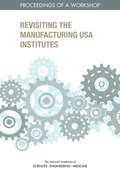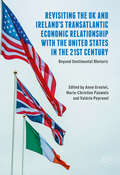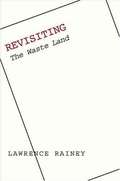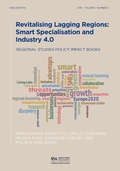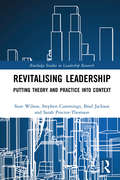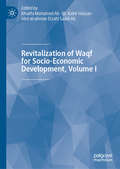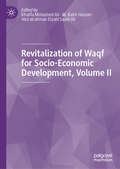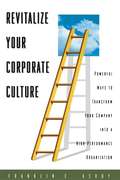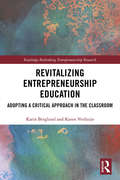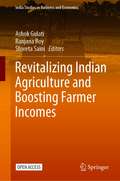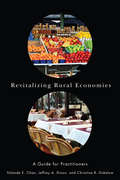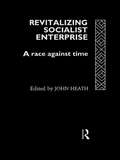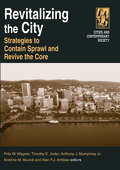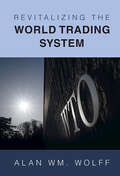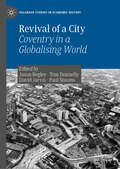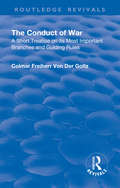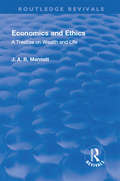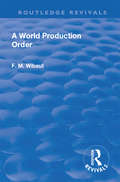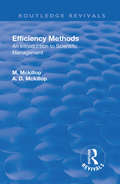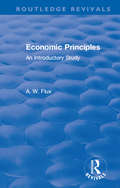- Table View
- List View
Revisiting the Manufacturing USA Institutes: Proceedings Of A Workshop
by Engineering Medicine National Academies of SciencesThe Manufacturing USA initiative seeks to reinforce U.S.-based advanced manufacturing through partnerships among industry, academia, and government. Started in 2012 and established with bipartisan support by the Revitalize American Manufacturing and Innovation Act of 2014, the initiative envisages a nationwide network of research centers for manufacturing innovation. Some 14 manufacturing innovation institutes have been established to facilitate the movement of early-stage research into proven capabilities ready for adoption by U.S. manufacturers. To better understand the role and experiences of the Manufacturing USA institutes, a committee of the National Academies of Sciences, Engineering, and Medicine convened a workshop on May 23, 2017 drawing together institute directors and manufacturing policy experts along with leaders from industry, academia, and government. Given the continued prominence of enhancing domestic manufacturing and international competitiveness in public policy discussions, the National Academies convened a second workshop on November 14, 2018, to monitor the progress of the Manufacturing USA institutes. This publication summarizes the presentations and discussions from this second workshop.
Revisiting the Meaning of Leadership
by Rakesh Khurana Joel M. Podolny Marya BesharovThe authors of this chapter contend that the study of leadership in organizational theory went awry when interest in leadership became too tightly coupled with organizational performance. Leading organizational theorists in the latter part of the twentieth century, such as Max Weber, Chester Barnard, and Philip Selznick, were not concerned with leadership because of its ability to explain financial performance. Instead, they were concerned with leadership's importance in infusing purpose and meaning into the lives of individuals. Although performance was not judged irrelevant by these earlier theorists, neither was it central. For them the primary significance of leadership rested in its importance in stemming the loss of meaning that they and other scholars of their time ascribed to modernity. The authors of this chapter conclude that if we are to judge the importance of leadership to organizational life, we need to break free from the strict interdependence of leadership success and organizational performance-and take a much broader view. This chapter was originally published as Chapter 3 of "Handbook of Leadership Theory and Practice: A Harvard Business School Centennial Colloquium."
Revisiting the UK and Ireland’s Transatlantic Economic Relationship with the United States in the 21st Century
by Anne Groutel Marie-Christine Pauwels Valérie PeyronelThis book revisits the economic relationship that ties the UK andIreland to the United States in the aftermath of the greatest economic crisisof the past fifty years. Whenconsidering recent developments to these economic links, it appears thatoppositional forces are at work. On one hand, globalization and the rise of neweconomic powers may undermine the ties. Besides, Ireland's and the UK's EuropeanUnion membership could also loosen their economic ties with the US. Conversely,the future Transatlantic Trade and Investment Partnership agreement may wellstrengthen trade and investment links between the US and Europe. Are the economic bonds between the US, the UK and Ireland waning, assome pundits purport? Or are those claims overstated? Could their economicrelationship simply be going through a process of change? Although there maynot be a single and straightforward answer to these questions, the authors seekto address these issues and provide insight into the changing dynamics of thishistoric economic relationship.
Revisiting the Waste Land
by Lawrence S. RaineyThis groundbreaking book of literary detective work alters our understanding of T. S. Eliot's poetic masterpiece, The Waste Land. Lawrence Rainey not only resolves longstanding mysteries surrounding the composition of the poem but also overturns traditional interpretations of the poem that have prevailed for more than eighty years. He shines new light on Eliot's greatest achievement and on the poem's place in the modern canon. Far from the austere and sober monument to neoclassicism that admirers have praised,The Waste Land turns out to be something quite different: something grim and wild, unruly and intractable, violent and shocking and radically indeterminate, yet also deeply compassionate. Rainey looks at how Eliot went about writing the poem and at the sequence in which he composed the parts. Arriving at new insights into the poet's intentions, Rainey unsettles tradition-bound views of the poem and shows us that The Waste Land is even stranger and more startling than we knew.
Revitalising Lagging Regions: Smart Specialisation and Industry 4.0 (Regional Studies Policy Impact Books)
This Expo book brings together leading academic and policymaker experts to reflect on the significant challenges faced by lagging regions in participating in the European Union’s Research and Innovation Strategies for Smart Specialisation (RIS3) programme. In doing so, the book offers a set of new policy recommendations on the design and implementation of appropriate Smart Specialisation Strategies (S3) in lagging regions, which may enable them to benefit from the opportunities of digitalisation and Industry 4.0 (I4.0).
Revitalising Leadership: Putting Theory and Practice into Context (Routledge Studies in Leadership Research)
by Brad Jackson Stephen Cummings Suze Wilson Sarah Proctor-ThomsonRevitalising leadership connects leadership theory and practice with context. It argues that the universal prescriptions favoured by most leadership scholars ignore the reality that context always matters in leadership practice – and so it should matter in leadership theorizing too. Addressing this gap, the book offers a novel framework that enables the development of context-sensitive leadership theory and practice. This framework directs theoretical and practical attention to the key challenges for leadership in different organizational contexts. It involves developing a specific purpose for leadership in a given context, as well as formulating the values, norms and domains of action which should guide leadership efforts in that context. Determining these various matters then informs the role, responsibilities, rights, behaviours and attributes relevant to leaders and followers for that context, and the focus, purpose and boundaries of the leader-follower relationship. Deploying this framework, six in-depth illustrative theorisations are provided, showing how leadership practice might best take shape in the contexts of supervisory management; HR management; innovation and entrepreneurship; strategy; governance; and leadership studies itself. Revitalising leadership will appeal to diverse audiences, due to its theoretical novelty, its diversity of illustrative examples, its practice-focussed orientation and its clear, engaging style. These include leadership scholars concerned with the lack of attention being paid to context in leadership theorizing; organizational scholars wanting to learn how leadership thinking can be brought to bear on the different management functions the book explores; practitioners seeking leadership ideas that are tailored to the context they lead and follow in; and those involved in MBA or leadership development programmes who are looking to combine the personal reflection sought by such programmes with a thoughtful analysis of the context in which their leadership practice takes place.
Revitalization of Waqf for Socio-Economic Development, Volume I
by M. Kabir Hassan Khalifa Mohamed Ali Abd elrahman Elzahi Saaid AliThis book explores the various aspects of Waqf management in IsDB member countries/jurisdictions as well as in non-Muslim majority countries. Topics covered include Waqf regulation, its modernization and relationship to Maqasid Al-Shari’ah; performance of Waqf activities; time and activity-wise distribution of Waqf resource management; the antecedents and consequences of Waqf assets (both physical and cash); the strategies and models to promote Waqf-related activities for greater socio-economic development; good governance practices through the formulation of informed policies for Waqf projects; the confluence of Waqf, zakah, charity, and Islamic microfinance impacting socio-economic development and so on. Comprising different issues and perspectives adopted by various authors/researchers, the book is specifically designed to meet the needs of academics and industry practitioners in the field of Islamic finance to provide general and Shari’ah guidelines on the emerging issues within the subject.
Revitalization of Waqf for Socio-Economic Development, Volume II
by M. Kabir Hassan Khalifa Mohamed Ali Abd elrahman Elzahi Saaid AliThis book provides a comprehensive analysis of Waqf management and its impact on socio-economic development, specifically financial inclusion and sustainable development as well as of the legal issues in Waqf management in IsDB member countries and jurisdictions. It explores various aspects of Waqf management in IsDB member countries/jurisdictions as well as in non-Muslim majority countries such as Waqf regulation, its modernization, and relationship to Maqasid Al-Shari’ah; performance of Waqf activities; time and activity-wise distribution of Waqf resource management; the antecedents and consequences of Waqf assets (both physical and cash); the strategies and models to promote Waqf related activities for greater socio-economic development; good governance practices through the formulation of informed policies for Waqf projects, among others. Comprising different issues and perspectives adopted by various researchers, the work is specifically designed to meet the needs of academics and industry practitioners in the field of Islamic finance.
Revitalize Your Corporate Culture
by Franklin C. Ashby, Ph.D.Adapt or die—this is the simple choice that business has always faced. Here's a valuable guide to the how's, what's, when's, and why's of that choice. 'Revitalize Your Corporate Culture' will help you to: *Diagnose your company's culture *Understand the features of a positive corporate culture *Design a strategy for an effective culture change *Gain the full support of staff to implement a new, positive culture *Maintain the momentum after the new corporate culture plan is in place *Shared values and unwritten rules (your company's culture) can profoundly enhance—or destroy—economic success. This book supplies all the steps necessary to increase productivity, make your organization more cost effective, and help you change your organization into a more dynamic, innovative, and collaborative organization. Whether you are a senior executive or a middle-level manager, this book gives you techniques that will motivate, encourage, and prepare your staff to meet the challenges of the 21st century.
Revitalizing Dell
by Jan W. RivkinDell Inc., with its vaunted Direct Model, defined success in the personal computer industry for more than a decade. Starting in the mid-2000s, however, the company fell on hard times. In 2009, Michael Dell and his management team must figure out why the Direct Model has faltered and what they can do to revitalize the company.
Revitalizing Entrepreneurship Education: Adopting a critical approach in the classroom (Routledge Rethinking Entrepreneurship Research)
by Karin Berglund Karen VerduynWithin mainstream scholarship, it’s assumed without question that entrepreneurship and entrepreneurship education are desirable and positive economic activities. Drawing on a wide range of theoretical approaches and political-philosophical perspectives, critical entrepreneurship studies has emerged to ask the questions which this assumption obscures. Students of entrepreneurship need to understand why and how entrepreneurship is seen as a moral force which can solve social problems or protect the environment, or even to tackle political problems. It is time to evaluate how such contributions and insights have entered our classrooms. How much – if any – critical discussion and insight enters our classrooms? How do we change when students demand to be taught "how to do it", not to be critical or reflexive? If educators are to bring alternative perspectives into the classroom, it will entail a new way of thinking. There is a need to share ideas and practical approaches, and that is what the contributions to this volume aim to do and to illuminate new ways forward in entrepreneurship education.
Revitalizing Indian Agriculture and Boosting Farmer Incomes (India Studies in Business and Economics)
by Ashok Gulati Ranjana Roy Shweta SainiThis open access book provides an evidence-based roadmap for revitalising Indian agriculture while ensuring that the growth process is efficient, inclusive, and sustainable, and results in sustained growth of farmers’ incomes. The book, instead of looking for global best practices and evaluating them to assess the possibility of replicating these domestically, looks inward at the best practices and experiences within Indian states, to answer questions such as -- how the agricultural growth process can be speeded up and made more inclusive, and financially viable; are there any best practices that can be studied and replicated to bring about faster growth in agriculture; does the prior hypothesis that rapid agricultural growth can alleviate poverty faster, reduce malnutrition, and augment farmers’ incomes stand? To answer these questions, the book follows four broad threads -- i) Linkage between agricultural performance, poverty and malnutrition; ii) Analysing the historical growth performance of agricultural sector in selected Indian states; iii) Will higher agricultural GDP necessarily result in higher incomes for farmers; iv) Analysing the current agricultural policy environment to evaluate its efficiency and efficacy, and consolidate all analysis to create a roadmap. These are discussed in 12 chapters, which provide a building block for the concluding chapter that presents a roadmap for revitalising Indian agriculture while ensuring growth in farmers’ incomes.
Revitalizing Liberal Values in a Globali
by Ruud LubbersThe longest serving Dutch Prime Minister (1982-94), Professor Lubbers is known for his support of liberal values, social equity, human rights, democratic governments, and spirituality. In this book he explores ways to conciliate these values with global economization.Dr. Lubbers argues that the global economy created by new information technologies has led to a competitive world atmosphere that works against social equity, local movements, and national interests. In this context he urges that steps be taken to ensure that the new era evolves in the interests of justice, peace, and fairness. Such steps may include combining the governance of nation states; providing development assistance; supporting initiatives in legislation and jurisprudence, such as an international criminal court, and initiating a global dialogue on values. For Dr. Lubbers, liberal values mean a "just, sustainable, and participatory society."This volume presents the third in a series of lectures that offer reflections by well-known figures on topical, liberal-oriented themes. This particular lecture has the distinction of never having been delivered, since Toronto was in the midst of a crippling snowstorm on the afternoon of 14 January 1999, when Lubbers was scheduled to speak at Victoria University. The two earlier volumes in the series present lectures by John Kenneth Galbraith and Michael Ignatieff.
Revitalizing Rural Economies
by Yolande Chan Jeff Dixon Christine DukelowRural communities in Canada are facing a new reality where traditional economic bases such as agriculture, forestry, and manufacturing have eroded. The digital divide, whereby rural Canada lags in access to broadband, has created further barriers to participating in the emerging knowledge economy. Revitalizing Rural Economies offers practical tools for developers, business people, and community leaders. The result of a partnership between the Monieson Centre at Queen's School of Business and entrepreneurs, policy makers, economic development officials, and elected representatives from rural communities across southern Ontario, Revitalizing Rural Economies draws on four years of community-based research to provide strategies for economic revitalization. Integrating case studies and community development guidelines, the authors explore themes such as the building blocks for community economic development (CED), innovation, community assets, vibrant downtowns, social capital accumulation through collaboration and inclusion, and new opportunities for rural economies through creative and value-added businesses. Designed as a practical guide, this book serves as a primer to CED, while also allowing those familiar with the field to delve deeper. Case studies ground the discussion in the challenges and opportunities facing communities. The book provides ideas and resources to foster the long-term resilience of rural regions.
Revitalizing Rural Economies: A Guide for Practitioners
by Jeff Dixon Yolande E. Chan Christine R. DukelowRural communities in Canada are facing a new reality where traditional economic bases such as agriculture, forestry, and manufacturing have eroded. The digital divide, whereby rural Canada lags in access to broadband, has created further barriers to participating in the emerging knowledge economy. Revitalizing Rural Economies offers practical tools for developers, business people, and community leaders. The result of a partnership between the Monieson Centre at Queen's School of Business and entrepreneurs, policy makers, economic development officials, and elected representatives from rural communities across southern Ontario, Revitalizing Rural Economies draws on four years of community-based research to provide strategies for economic revitalization. Integrating case studies and community development guidelines, the authors explore themes such as the building blocks for community economic development (CED), innovation, community assets, vibrant downtowns, social capital accumulation through collaboration and inclusion, and new opportunities for rural economies through creative and value-added businesses. Designed as a practical guide, this book serves as a primer to CED, while also allowing those familiar with the field to delve deeper. Case studies ground the discussion in the challenges and opportunities facing communities. The book provides ideas and resources to foster the long-term resilience of rural regions.
Revitalizing Socialist Enterprise: A Race Against Time
by John HeathFollowing the collapse of socialism in Eastern Europe, immediate concerns for the former socialist states have been largely economic. However, whilst much has been written about government policies, relatively little has addressed change at the enterprise level. This book does this by means of case studies and careful cross-country comparisons.
Revitalizing State Bank of India
by Srikant M. Datar Rachna Tahilyani N. M. Bhatta Rishikesha KrishnanState Bank of India is India's oldest and largest bank with the government of India as its majority shareholder. Arundhati Bhattacharya, a 35-year old veteran of the bank, is appointed as its chairman in October 2013. Her appointment coincides with Moody's downgrading the bank's debt due to rising non-performing assets. She embarks on a mission to improve the bank's risk taking and management abilities, ensure uniform customer experience, and encourage greater collaboration among various verticals. Her efforts help the bank reduce it non-performing assets and improve its profitability. However, Bhattacharya knows that these gains will be fleeting without the development of a trained workforce who can address 21st century industry problems with speed and creativity. This requires transforming SBI into a performance-oriented bank supported by a new career development and remuneration system. Bhattacharya wonders if attempting to change the culture of a 206-year old mammoth organization is feasible or a mere pipe dream.
Revitalizing the City: Strategies to Contain Sprawl and Revive the Core (Cities And Contemporary Society Ser.)
by Fritz W. Wagner Timothy E. Joder Krishna M. Akundi Anthony J. Mumphrey, Jr Alan F.J. ArtibiseThis practical work demonstrates that controlling urban growth and reviving central city economies are not mutually exclusive endeavors. Rather than re-hash theories of urban development, the contributors describe and evaluate successful community-tested approaches to sustaining our cities. Revitalizing the City provides actual case examples of urban success stories - ranging from San Diego's "smart growth" initiative to brownfield redevelopment in Pittsburgh. The book is divided into four major sections - Urban Growth; Metropolitan Development and Administration; Central City Redevelopment Strategies; and Central City-Suburban Cooperation. Each chapter includes an analysis of key issues, descriptions of specific local initiatives, highlights of effective policies or programs, and potential pitfalls to avoid. Revitalizing the City has broad appeal for the urban policy community as well as for undergraduate and graduate courses in urban sociology, geography, political science, and urban studies and planning.
Revitalizing the World Trading System
by Alan Wm. WolffIn recent years, the world trading system has been confronted by a range of new and developing challenges: the risk of climate change, the instability of the digital economy, the ongoing impacts of COVID-19 and the threat of future pandemics, to name but a few. In this book, veteran trade negotiator, Ambassador Alan Wm. Wolff, draws from his years of experience at the World Trade Organization to consider the history of trade, the current trading system and how it should be reformed in the future. Offering a rare insight into the inner workings of the WTO, Wolff is uniquely placed to identify deficiencies in the current system and suggest actionable solutions. This essential guidebook to the WTO equips readers with the tools and knowledge required to tackle to emerging and emergent challenges of a global trading system.
Revival of a City: Coventry in a Globalising World (Palgrave Studies in Economic History)
by Jason Begley Tom Donnelly David Jarvis Paul SissonsIn 2021 Coventry celebrates being the national City of Culture. Modern Coventry is a product of successive rounds of industrial, economic and social developments driven by regional, national and global forces. This book presents a timely opportunity to reflect on this rich, and often misunderstood, history.The book examines the development of industry, services, infrastructure and social transformation, and the role which globalising forces have played in influencing these, particularly since the 1950s. It looks at the experiences of the city of Coventry in responding to the challenges of socioeconomic change, technological advances, reconstruction and renewal.Issues of investment, economic decline, reconstruction, employment change and local and national governance are all considered in assessing the story of modern Coventry, a city influenced by new industries and development opportunities while still being shaped by its historical economic challenges. By focusing on the case of Coventry this book contributes to debates surrounding urban structural change, economic diversification and resilience from the perspective of a medium-sized city.
Revival: A Short Treatise on its Most Importsant Branches and Guiding Rules (Routledge Revivals)
by Colmar Freiherr von de GoltzThis book contains, in a brief form, author’s views a to the conduct of the principal strategical and tactical operations of war, and will be found to be a short and convenient introduction to a deeper study of the rules which should underlie the direction of the ever-varying incidents of modern fighting.
Revival: A Treatise on Wealth and Life (Routledge Revivals)
by John Arthur MarriotThe argument of this book is addressed to those who desire to order their daily lives, in the homme, in the shop, in the factory, or on the farm, in conformity with the highest ethical standards, or in more familiar words, to live according to the will of God; and to them only. They constitute, I hope, a large proportion of mankind but be that as it ma, I know that there are at present among them many who are sorely perplexed in mind, and gravely disturbed in conscience, by the apparent contradiction between the precepts of ethics and the laws of economics. It is my earnest hope that in this book they mind some help towards the solution of their difficulties
Revival: A World Production Order (1935) (Routledge Revivals)
by F. M. WibautThe aim of this book is to prove that at this present time, with our conditions of production, periodically recurrent depressions, with all their consequences are inevitable. This book will also aim to show a way that such depressions can be avoided, and will suggest a way towards a world production scheme which is fitted to serve the interests of men. The statistical data to support the arguments made in this book were supplied by Professor Dr. J. Tinbergen, and Mr. D. Groenveld, Eng.
Revival: An Introduction to Scientific Management (Routledge Revivals)
by Margaret Mackillop Alister D. MackillopThe authors desire to express their very, sincere thanks to Mr. F. B. Gilbreth for permission to use four of his photographs as illustrations, and to Mr. J. F. Butterworth, Mr. Gilbreth's general representative in England, for considerable assistance and helpful criticism. They are also glad to record their gratitude to Mr. H. W. Allingham, M. I. M. E., to whom they owe their introduction to Efficiency Methods, a good deal of information, and the opportunities they have had of seeing the system in operation, and (one of them) of working under it.Practically all the important books of reference on the subject are mentioned in the text. A Bibliography of books and magazine articles, up to 1914, will be found in C. Bertrand Thompson's collection of papers published under the title of "Scientific Management." This collection includes many original documents otherwise difficult to obtain, and forms an excellent historical sketch of the subject, considered as a movement. H. B Drury's "History and Criticism of Scientific Management" appeared in 1915, and was followed in 1916 by R. F. Hoxies "Scientific Management and Labour," for the most part very searching criticism.
Revival: An Introductory Study (Routledge Revivals)
by A.W. FluxThe text contains no explicit reference to mathematical apparatus which has rendered eminient service in economics, especially in recent years. Some of the simpler applications of algebraic symbols and geometrical diagrams to econcomic problems are presented in an appendix. Those to whom these forms of expression tend rather to confuse than to clarify the reasoning which they embody, may thus readily spare themselves this confusion; while those to whom symbols are familiar and helpful will not be deprived of the aid to precision of conception and of argument which can hardly be afforded in equal degree by any other means.
